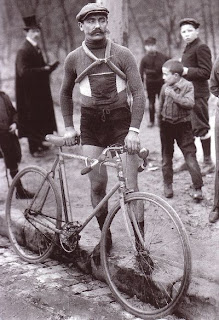There is one incident that perhaps best captures his spirit. It happened during the 1913 Tour de France, his third Tour. Many believe that Christophe had been robbed of his victory the previous year due to a peculiar change in the rules to award the victory based on points, rather than time. The 1913 Tour was his chance to redeem that earlier loss. He was well ahead of the pack, pursuing Philippe Thys on a steep descent of the Tourmalet, when his fork broke. Christophe describes it like this:
“I plunged full speed towards the valley... I was then heading the general classification with a lead of 18 minutes. So, I was going full speed. All of a sudden, about ten kilometres from Ste-Marie-de-Campan down in the valley, I feel that something is wrong with my handlebars. I cannot steer my bike any more. I pull on my brakes and I stop. I see my forks are broken. Well, I tell you now that my forks were broken but I wouldn't say it at the time because it was bad publicity for my sponsor.”
At that time, the Tour rules required competitors to perform all of their own repairs. There were no team vehicles to swoop in and save the day with a new bike. Stranded at least 10 km from the nearest town with a broken fork, most of us would have thrown in the towel. But not Christophe. He hefted the bike on his back and started trudging down the muddy road, enduring the humiliation of other riders streaming past him as he went.
“And there I was left alone on the road. When I say the road, I should say the path. All the riders I had dropped during the climb soon caught me up. I was weeping with anger. I remember I heard my friend Petit-Breton shouting as he saw me, 'Ah, Cri-Cri, poor old lad.' I was getting angry. As I walked down, I was looking for a short cut. I thought maybe one of those pack trails would lead me straight to Ste-Marie-de-Campan. But I was weeping so badly that I couldn't see anything. With my bike on my shoulder, I walked for more than ten kilometres.”
Two hours later, when he finally reached town, Christophe asked a little girl to direct him to the blacksmith’s shop. Bear in mind that the Tour rules required riders to make all their own repairs. With nothing more than verbal guidance from the blacksmith, he operated the forge to repair his broken fork. It was impossible for anyone to stoke the bellows and operate the forge at the same time, however, so he enlisted one of the bystanders, a 7-year-old boy named Corni, to work the bellows for him. After 3 hours of grueling work, the fork was fixed.
Christophe had a quick snack, and then prepared to set off to finish the race. But there was one more outrage for the exhausted competitor to endure. Tour officials fined him 10 minutes (later reduced to 3 minutes) because he had not completed his repairs entirely by himself. He was penalized for allowing a little boy to operate the bellows for him. Christophe went on to finish the race in 29th place, which isn’t bad when you consider that he actually beat 15 other riders, who came in even later. Had it not been for the metallurgical disaster, the 1913 Tour could have been his best shot at victory. Ironically, if they had stuck with the points-based system of the previous year, Christophe might well have won in 1913 despite his setbacks.
I think of this story often when I suffer a minor mechanical setback. Thankfully, I have never had to deal with a broken fork. If I did, I would probably call someone and get a ride to a bike shop. The amazing thing about Christophe, the aspect of his character that most endeared him to his fans, was his indomitable spirit. He seemed to suffer more than his share of outrageous fortune, but he never gave up.

[Thanks to Wikipedia and McGann’s Story of the Tour de France for much of the source material.]



No comments:
Post a Comment